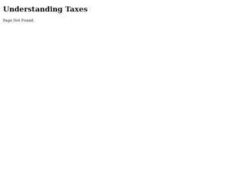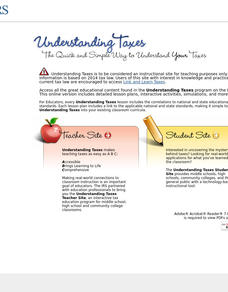Internal Revenue Service
Understanding the IRS: The IRS Yesterday and Today
Pupils explain why the Internal Revenue Service was instituted, how it functions, how it has changed over the years, and the ways it helps taxpayers today.
Curated OER
Module 13-Electronic Tax Return Preparation and Transmission
Students explain the electronic preparation and transmission of tax returns. They describe the ways to prepare and transmit tax returns and explain the benefits of electronic tax return preparation and transmission.
Curated OER
The Five W's of Tax Day
Use April 15th to teach your students the fundamentals of the American federal tax system.
Council for Economic Education
Tax Time Scavenger Hunt
Is a 1040EZ tax form really easy? Scholars investigate the complexities of the United States taxation system with an economics lesson. Using a wide variety of web sources, they interpret IRS taxation rules and regulations to better...
Curated OER
Good News and Bad News: Income and Taxes
Students examine Internal Revenue Service (IRS) Form 1040, citing particular line items that are pertinent to an artist acting as an entrepreneur. They explore various sources of income and the importance of keeping accurate income records.
Curated OER
The Politics Of Taxation
Students explain that taxation involves a compromise of conflicting goals and that lobbyists can influence lawmakers' decisions about taxes. They can explain why people of similar incomes often pay different tax rates and work in teams...
Curated OER
The Artist as Entrepreneur: Is this a Hobby or a Business?
Students discover the IRS codes and criteria for establishing their art activity as a business rather than a hobby. They develop ways to demonstrate that their art activity is actually a business venture as classified by the IRS.
Curated OER
Methods of Filing
Students explain the methods of filing tax returns and the advantages of preparing and transmitting tax returns electronically. They identify the return method that is most appropriate for certain taxpayers.
Curated OER
Fairness in Taxes
Students identify and describe two criterion of tax fairness: benefits received and the ability to pay and distinguish between wealth and income as measures of ability to pay.
Curated OER
Regressive Taxes
Students explain that regressive taxes can have different effects on different income groups. They see how a regressive tax takes a larger share of income from low-income groups than from high-income groups.
Curated OER
Module 8-Tax Credit for Child and Dependent Care Expenses
Young scholars explain the tax credit for child and dependent care expenses. They distinguish between a tax deduction and a tax credit. They see how the tax credit for child and dependent care expenses affects the tax liability.
Curated OER
Module 12-Self-Employment Income and the Self-Employment Tax
Learners explain self-employment income and the self-employment tax. They distinguish between an employee and an independent contractor and explain how to compute and report self-employment profit.
Curated OER
The Wealth Tax of 1935 and the Victory Tax of 1942
Young scholars explain that during the Great Depression and World War II, the Roosevelt administration implemented new, broader, and more progressive taxes in order to cover the costs of the New Deal programs and the war.
Curated OER
The Taxpayer's Rights
Young scholars examine rights of taxpayers and procedures the IRS uses to process tax returns
Curated OER
Understanding Taxes
Students engage in a variety of lesson plans published by the IRS. They participate in lessons involving how taxes apply and why taxes exist. They view Power Point presentations, complete worksheets, and participate in activities on tax...
Curated OER
Filing Status
Students examine then discuss the rate at which income is taxed and the five filing statuses. They complete online simulation worksheets then they answer a list of questions.
Curated OER
Bookkeeping 101
Students state the important questions that must be answered through the use of expense records. They design and test a method for recording business expenses.
Curated OER
Intimidation of a Nation
Students discuss their understanding of "intimidation." In groups, they analyze and discuss recent terrorist threats to the scheduled democratic elections in Iraq, and then reflect on whether they believe the elections should continue as...
Curated OER
Taxes in U.S. History: The Social Security Act of 1935
Students explain the history of the Social Security Act and the FICA tax. They describe what Social Security is and whom it is intended to help. They explain the purpose of the FICA tax.
Curated OER
Taxes in U.S. History: Tax Reform in the 1960s and 1980s
Learners explain the content, purpose, and impact of the Tax Reform Acts of 1969 and 1986.
Curated OER
Fairness in Taxes: Progressive Taxes
Students define and give an example of a progressive tax. They explain how a progressive tax takes a larger share of income from high-income groups than from low-income groups. They examine taxation in other countries.
Curated OER
Proportional Taxes
Students are able to define and give an example of a proportional tax and the impact that it can have on different income groups and explain how a proportional tax takes the same percentage from all tax groups.
Curated OER
Natural Resources and Ancient Cities
Students explain how the availability of natural resources has affected human settlement patterns. They recognize the interactions of human populations on environments and compare the growth of two ancient cities in relation to natural...
Curated OER
Taxes in U.S. History: Evolution of Taxation in the Constitution
High schoolers receive an overview of the role and purpose of taxes in American history. They identify different types of taxes implemented by the US government and explain the origin of the federal income tax.
Other popular searches
- Er Ir Ur
- Ar or Er Ir Ur Words
- Phonics Ir, Er, Ur
- Phonics Ur Er Ir
- Er Ir Ur Words
- Ir Words
- Spelling Y Irs
- Ai Ay Ir Oa
- Spanish Ir
- S Es Irs
- Spanish Ir Dar Estar
- Noun Irs



